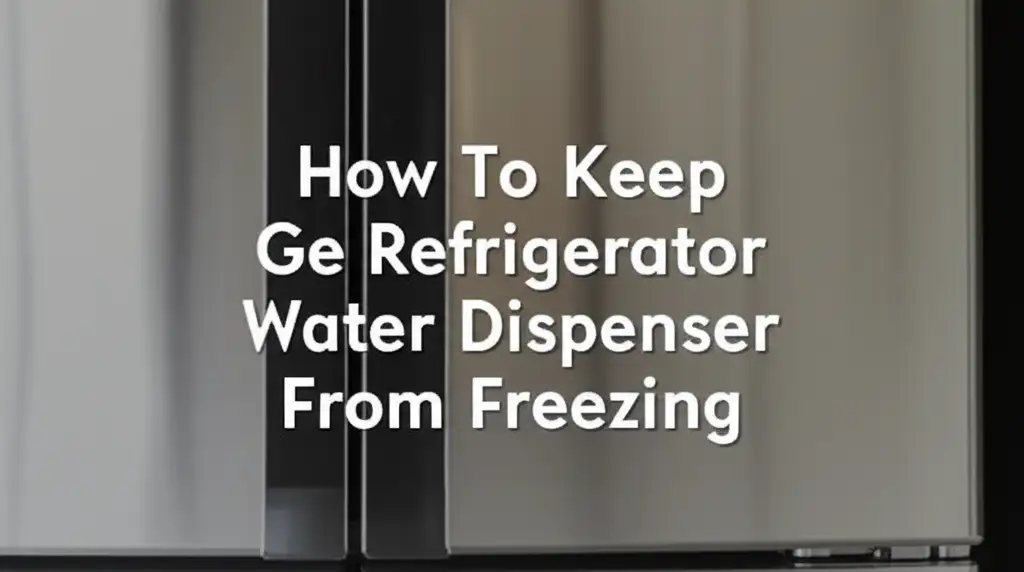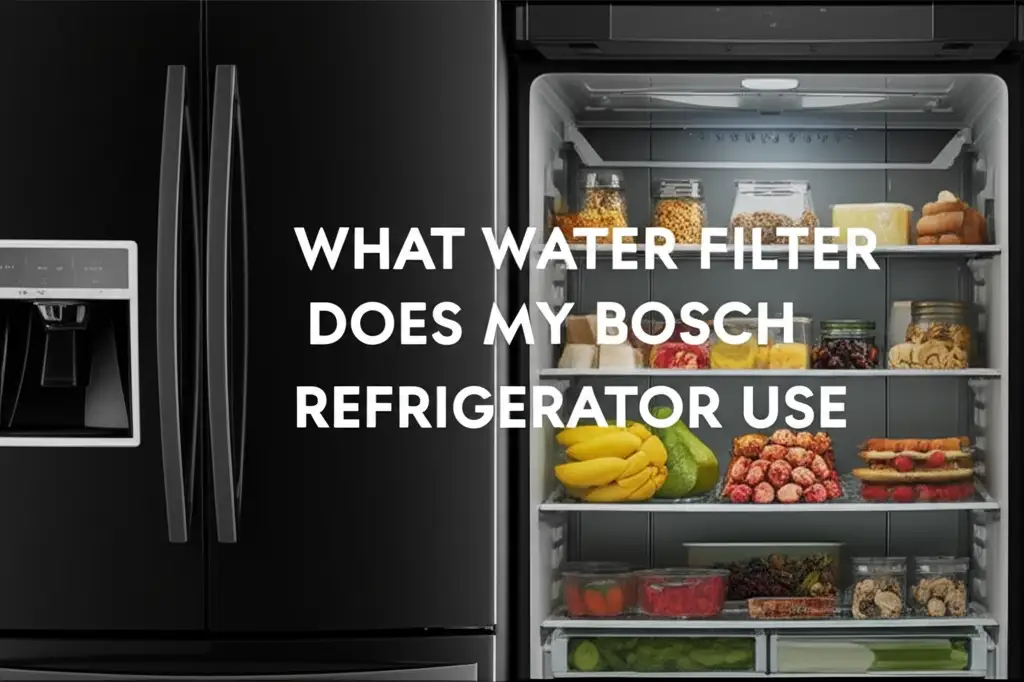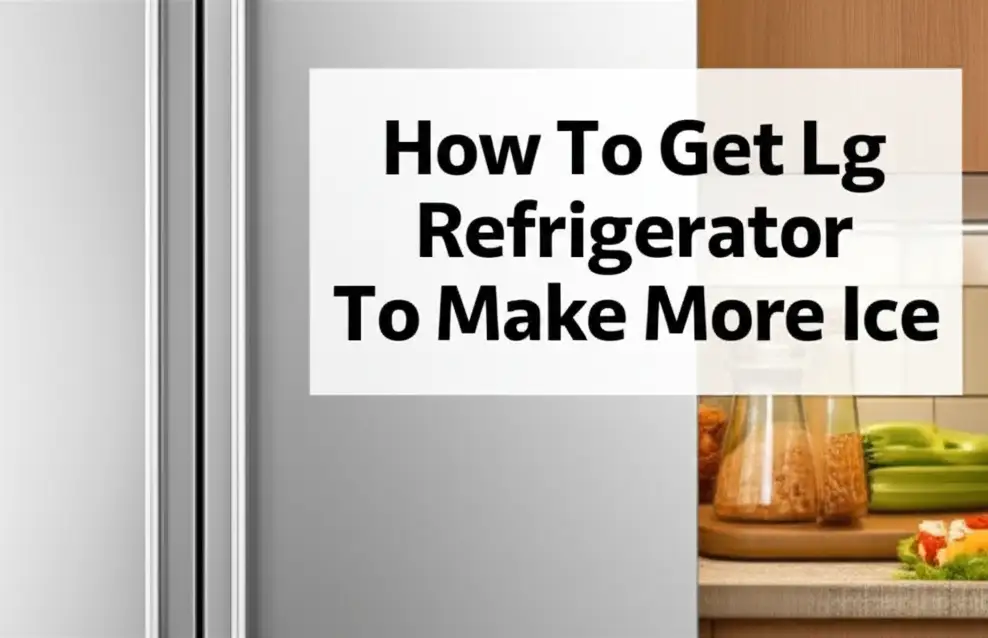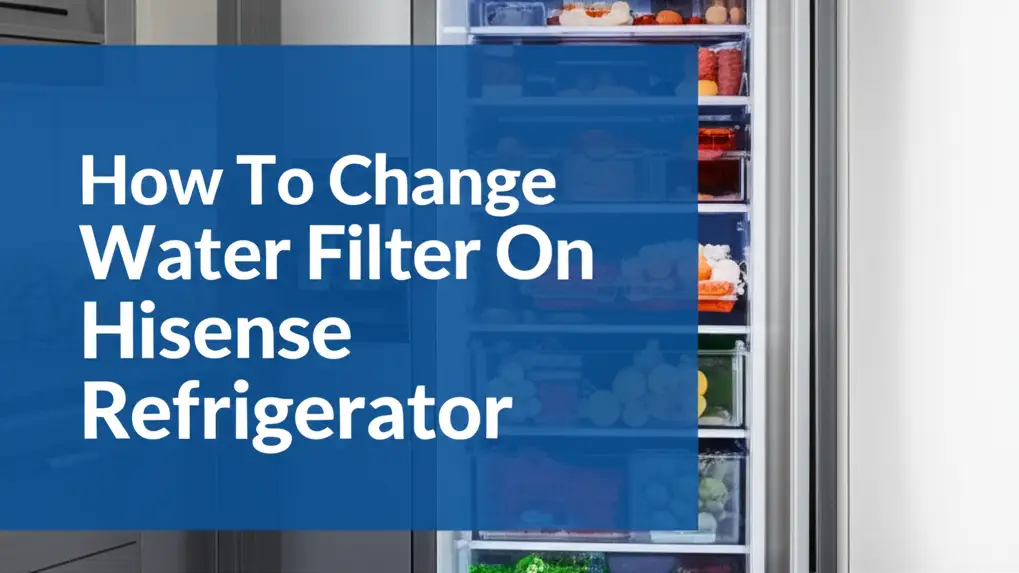· Todd Martin · Refrigerator Maintenance · 18 min read
Can I Bypass My Ge Refrigerator Water Filter
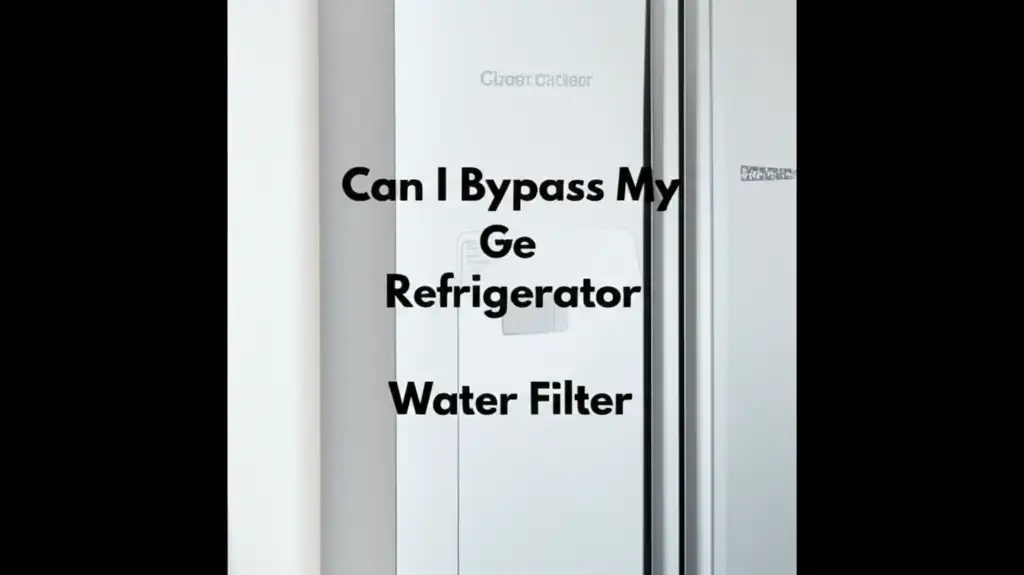
Can You Safely Bypass Your GE Refrigerator Water Filter?
Have you ever wondered if you can just remove that GE refrigerator water filter and forget about it? Many homeowners consider this option for various reasons. Perhaps you are tired of replacing the filter, or you are experiencing slow water flow. I understand the frustration that can come with appliance maintenance. This article explores whether you can bypass your GE refrigerator water filter. We will discuss the methods for doing this, the potential risks involved, and better alternatives. You will gain a clear understanding of what happens when you bypass the filter and how to make an informed decision for your home.
Takeaway:
- Bypassing your GE refrigerator water filter is possible, typically using a bypass plug.
- Bypassing means your dispensed water will not be filtered for contaminants.
- The primary risks include consuming unfiltered water and potential appliance damage.
- Alternatives like regular filter replacement or whole-house filtration offer safer solutions.
- Always use a GE-approved bypass plug to avoid leaks or system damage.
Yes, you can bypass your GE refrigerator water filter. GE refrigerators are designed to operate with or without the filter in place, usually by inserting a bypass plug. This plug allows water to flow directly to the dispenser and ice maker without passing through the filtration cartridge.
Understanding Your GE Refrigerator Water Filter System
Your GE refrigerator’s water filter system is a vital component. It works to improve the quality of the water you drink and use for ice. The filter cartridge is designed to capture impurities before they reach your glass. This system provides convenience and health benefits right in your kitchen.
How GE Water Filters Work
GE refrigerator water filters use activated carbon to clean your water. Water flows through the carbon block inside the filter. This carbon material has many tiny pores. These pores trap contaminants such as chlorine, sediment, and certain volatile organic compounds (VOCs). The filter removes unpleasant tastes and odors. It also reduces some harmful substances.
The filtration process improves the aesthetics and safety of your drinking water. Over time, the filter’s pores become clogged with trapped particles. This reduces its effectiveness and water flow. This is why GE recommends regular filter replacement. You can find out more about what specific filter your model uses by checking What Water Filter Does My GE Refrigerator Use. Knowing your filter type helps you understand its function better.
Importance of Filtered Water for Health
Drinking filtered water offers significant health benefits. Unfiltered tap water can contain various substances. These include chlorine, lead, pesticides, and other industrial pollutants. While municipal water is treated, it may still pick up contaminants in pipes. A GE water filter reduces your exposure to these substances.
Filtered water tastes better. It encourages you to drink more water. This is good for overall hydration. It also helps protect your family from potential long-term health issues linked to contaminated water. Many people underestimate the quality of their tap water. The refrigerator filter acts as a final barrier to ensure cleaner, safer water.
How a Clogged Filter Impacts Your Refrigerator
A clogged water filter affects more than just water quality. It can impact the performance of your refrigerator’s water and ice dispenser. When the filter is full, water struggles to pass through. This results in slow water dispensing. It also leads to reduced ice production.
You might notice a change in the taste of your water or ice. This indicates the filter is no longer effective. Ignoring a clogged filter can also put a strain on your refrigerator’s water line. In rare cases, it can cause leaks or other issues. Replacing your filter regularly prevents these problems. It ensures your refrigerator operates efficiently. Information on How Long Does GE Refrigerator Water Filter Last can help you plan replacements.
Reasons for Considering a GE Refrigerator Water Filter Bypass
Many homeowners think about bypassing their GE refrigerator water filter. There are several common reasons for this consideration. These reasons often relate to cost, convenience, or perceived issues with the filter itself. It is important to understand these motivations.
Cost of Replacement Filters
One of the most frequent reasons people consider bypassing the filter is the cost. GE water filters need regular replacement. This can become an unexpected expense over time. Many filters cost between $30 and $60. They need changing every six months. This adds up annually.
Some homeowners look for ways to save money. Bypassing the filter seems like a simple solution. It removes the need for recurring filter purchases. They might assume their tap water is already good enough. Or they might use an external filter for their drinking water.
Slow Water Flow or No Water Dispensing
Another common issue is slow water flow from the dispenser. Sometimes, the water stops flowing completely. A clogged filter is often the culprit. As filters capture contaminants, their pores get blocked. This restricts water passage.
When water flow becomes a trickle, it is frustrating. You just want a quick glass of water. A fully clogged filter can even stop water dispensing. People might think removing the filter will solve this problem instantly. They might consider bypassing it rather than replacing it. If you are experiencing issues after replacing your filter, you might want to read Why Is My GE Refrigerator Not Dispensing Water After Replacing Filter.
Belief in Adequate External Filtration
Some households already have a whole-house water filtration system. Or they use a counter-top pitcher filter. In these cases, people might feel the refrigerator filter is redundant. They believe their water is already clean. Adding another layer of filtration seems unnecessary.
They might choose to bypass the refrigerator filter to simplify their system. They trust their primary filtration method. This saves them the cost and hassle of maintaining yet another filter. It is a logical step for those with existing robust water treatment solutions.
Methods for Bypassing a GE Refrigerator Water Filter
If you decide to bypass your GE refrigerator water filter, you need to know how. GE designs its refrigerators to accommodate this choice. The most common and recommended method involves using a specific part. This ensures water flow without a filter.
Using a GE Bypass Plug
The safest and most common way to bypass a GE water filter is with a bypass plug. GE refrigerators come with a bypass plug from the factory. This plug allows water to flow through the filter housing without passing through a filter cartridge. It is important to use the correct plug for your model.
Locate your filter housing. This is usually inside the refrigerator, in the top right corner, or in the grille at the bottom. Remove the existing filter. Insert the bypass plug into the housing. Turn it until it locks into place, just like a regular filter. This restores water flow to the dispenser and ice maker. This method prevents leaks and ensures system integrity. For specific filter replacement steps, which are similar to inserting a bypass plug, see How to Change Your GE Refrigerator Water Filter.
What if You Don’t Have a Bypass Plug?
Finding your original bypass plug might be difficult. Many people misplace it over time. If you do not have the plug, you should purchase one. You can find replacement bypass plugs online or at appliance parts stores. Ensure the plug is compatible with your specific GE refrigerator model.
Do not attempt to operate the refrigerator without either a filter or a bypass plug. This can cause severe water leaks. It can also damage your appliance. The filter housing needs to be sealed for the water system to work correctly. A missing plug creates an open pathway for water to escape.
Are There Other Methods?
Some people try to run their GE refrigerator without a filter or bypass plug. This is not recommended. It can lead to leaks and system damage. GE refrigerators need a component in the filter housing to complete the water circuit. Without it, water will spray out of the housing.
You might also consider cutting off the water supply to the dispenser. This is not a bypass method. It just shuts off water. It stops the dispenser from working. If you want water and ice, you must use a filter or a bypass plug. Using a bypass plug is the only safe way to achieve an actual filter bypass. This also relates to Can You Run GE Refrigerator Without Water Filter which details the implications of operating without either.
Potential Risks and Disadvantages of Bypassing Your GE Water Filter
While bypassing your GE water filter is possible, it comes with risks. These risks affect water quality, appliance function, and even your health. Understanding these potential downsides is crucial before proceeding. Do not make this decision lightly.
Consuming Unfiltered Water
The most significant risk is drinking unfiltered water. Your GE refrigerator filter removes various contaminants. These include chlorine, lead, cysts, and other pollutants. Without the filter, your dispensed water comes directly from your home’s water supply. This means any impurities present in your tap water will be in your drinking water and ice.
While municipal water meets safety standards, it can still contain substances that affect taste and odor. More importantly, older pipes can leach lead into water. Private wells may have undetected bacteria or chemicals. Bypassing the filter means you lose a critical barrier against these potential issues. Your health could be at risk without knowing it.
Potential Damage to Your Refrigerator
Operating your refrigerator without a filter, especially if you do not use the correct bypass plug, can cause damage. The filter housing is designed to hold either the filter or the bypass plug securely. If you try to run the appliance with an empty housing or a non-compatible part, leaks can occur.
Water leaks inside your refrigerator can lead to significant problems. Leaks can damage internal components, flooring, and cabinets. They can also create an environment for mold growth. A GE-approved bypass plug ensures a proper seal. This prevents such issues. Always verify you have the correct part.
Voiding Warranty or Affecting Performance
Bypassing the filter using unofficial methods could potentially void your refrigerator’s warranty. Manufacturers design their appliances to work with specific parts. Deviating from these recommendations might impact warranty coverage. Always check your appliance’s manual or warranty terms.
Even with a bypass plug, the long-term impact on your appliance is a consideration. While GE allows bypass, it assumes you are aware of the water quality trade-off. Reduced water quality can also lead to more mineral buildup in your ice maker or dispenser lines over time. This might lead to maintenance issues down the road.
Alternatives to Bypassing Your GE Refrigerator Water Filter
Bypassing your GE refrigerator water filter carries certain risks. Fortunately, there are several effective alternatives to consider. These options help ensure you have clean, safe drinking water without compromising your appliance’s performance or your health. I recommend exploring these before deciding on a bypass.
Regular Filter Replacement
The most straightforward and recommended alternative is regular filter replacement. GE recommends changing your refrigerator water filter every six months. This ensures optimal water quality and flow. Replacing the filter is a simple task that usually takes only a few minutes. Many models have easily accessible filters. For specific instructions, you can consult articles like How to Replace GE Side-by-Side Refrigerator Water Filter or How to Change Water Filter in GE French Door Refrigerator.
Regular replacement prevents slow water flow and keeps your water tasting fresh. It also helps maintain your refrigerator’s internal water system. While there is a cost involved, consider it an investment in your family’s health. You can also look for deals on multi-packs of filters to reduce the per-filter cost.
Using Generic or Aftermarket Filters
If the cost of GE-brand filters is a concern, consider using generic or aftermarket filters. Many companies produce compatible filters that fit GE refrigerators. These filters often cost less than the original equipment manufacturer (OEM) filters. They can provide similar filtration performance.
When choosing aftermarket filters, always check for certifications like NSF International. This ensures the filter meets specific standards for contaminant reduction. Read reviews to ensure reliability and compatibility. While they save money, some generic filters might not perform exactly like OEM ones. However, many offer a good balance of cost and performance.
Whole-House Water Filtration System
For comprehensive water treatment, a whole-house water filtration system is an excellent alternative. This system filters all water entering your home. It provides clean water for drinking, bathing, and all appliances. This eliminates the need for individual appliance filters.
A whole-house system is a larger upfront investment. However, it offers superior water quality throughout your entire home. It can reduce sediment, chlorine, and other contaminants from every tap. With a whole-house system, you can safely use a bypass plug in your GE refrigerator. Your water will still be filtered before it reaches the fridge. This provides clean water everywhere.
Point-of-Use Filters (Pitcher or Faucet)
If you only want filtered water for drinking, consider point-of-use filters. These include water filter pitchers or faucet-mounted filters. They are less expensive than refrigerator filters and offer flexibility. You can filter water only when you need it.
Pitcher filters are portable and easy to use. Faucet filters provide instant filtered water from your sink. These options allow you to bypass your GE refrigerator filter using a plug. You then rely on these smaller filters for your drinking water needs. This can be a cost-effective solution if your primary concern is drinking water quality.
Maintaining Optimal Water Quality Without the Filter
Deciding to bypass your GE refrigerator water filter means taking on the responsibility for water quality yourself. You will need to implement other strategies to ensure your drinking water remains clean and safe. This approach requires ongoing effort but can be effective.
Relying on Municipal Water Quality Reports
If you bypass your refrigerator filter, start by understanding your municipal water quality. Your local water utility releases annual water quality reports. These reports, often called Consumer Confidence Reports (CCRs), detail the contaminants found in your tap water. They also show how those levels compare to federal standards.
Reviewing these reports helps you know what your water contains. It tells you if there are specific concerns like lead or disinfection byproducts. If your water quality is consistently good, and you have no health concerns, relying on it might be acceptable. However, remember that these reports reflect source water and treatment plant output. Your home’s plumbing can still impact final water quality.
Using an Alternative Filtration Method
As discussed earlier, an alternative filtration method is key. If you bypass the refrigerator filter, you should implement another solution. Options include:
- Whole-house filtration systems: These filter all water entering your home. They provide comprehensive protection at every tap. This is ideal if you want filtered water for all uses, not just drinking.
- Under-sink filters: These install directly under your kitchen sink. They provide filtered water specifically for drinking and cooking. They are more powerful than pitcher filters.
- Filter pitchers or faucet filters: These offer a convenient way to filter water at the point of use. They are good for small volumes of drinking water.
Choosing and maintaining one of these alternative systems is crucial. It fills the gap left by bypassing the refrigerator filter. Without a replacement filtration method, your dispensed water is unfiltered.
Regular Cleaning of Water Dispenser and Ice Maker
Even if you bypass the filter, you still need to maintain your refrigerator’s water system. Water dispenser spouts and ice maker components can accumulate mineral deposits and mold over time. This happens regardless of filtration. Regular cleaning helps prevent buildup and keeps your water tasting fresh.
Use a mild soap and warm water solution to clean the dispenser spout. You can use a small brush for hard-to-reach areas. For the ice maker, follow your GE manual’s cleaning instructions. This usually involves discarding old ice, cleaning the bin, and sometimes running a cleaning cycle. Clean these components every few months. This ensures hygiene even without a filter.
Troubleshooting Common GE Refrigerator Water Issues
Sometimes, people consider bypassing their GE refrigerator water filter because of specific issues. Before taking that step, it is important to troubleshoot. Many common water problems have simple solutions. Bypassing the filter might not even be necessary.
Slow Water Dispensing
If your GE refrigerator dispenses water slowly, a clogged filter is the most common reason. As mentioned, filters get full of impurities over time. This restricts water flow. Try replacing the filter first. If the flow improves, the filter was the problem. You can find out more about How to Reset GE Refrigerator Water Filter Notification if you replace it.
Other causes of slow flow include a kinked water line or low house water pressure. Check the water line behind the fridge for kinks. Ensure the saddle valve on your home’s water pipe is fully open. If these are fine, consider professional help.
No Water Dispensing
When no water comes out, the issue might be more serious. Again, a severely clogged filter can cause this. Replace it to see if this fixes the problem. If it does not, check the water supply line. Ensure the water valve to the refrigerator is open.
A frozen water line inside the freezer door can also stop water flow. This often happens if the freezer temperature is too low. Try defrosting the line with a hairdryer on a low setting. Be careful not to melt any plastic parts. A faulty water inlet valve or dispenser switch can also be culprits. For more detailed troubleshooting, refer to Why Is My GE Refrigerator Water Dispenser Not Working After Replacing Filter.
Strange Taste or Odor in Water/Ice
An unusual taste or smell usually means your filter is exhausted. It can no longer remove contaminants. Replace the filter immediately. After replacement, run several gallons of water through the dispenser to flush the system. Discard the first few batches of ice.
If the taste or odor persists after a new filter, it might indicate an issue with your home’s water supply. Consider having your tap water tested. Sometimes, old water in the lines or dirty ice bins can also cause taste issues. Clean your ice maker and dispenser regularly.
Water Leaks from Filter Area
Leaks from the filter area are serious. They often point to an improperly installed filter or a faulty filter housing. If you just installed a new filter, remove it and reinsert it carefully. Make sure it clicks into place. Ensure the o-rings on the filter are not damaged.
If the leak continues, the filter housing might be cracked or defective. In this case, you should contact a GE service technician. Do not attempt to bypass the filter if leaks are present, especially if they are not related to filter installation. This could worsen the problem.
When to Seek Professional Help for Your GE Refrigerator
While some issues can be resolved with DIY troubleshooting, knowing when to call a professional is important. Attempting repairs beyond your skill level can lead to more damage. It can also be unsafe. A qualified technician can diagnose and fix complex problems.
Persistent Water Flow Issues
If you have tried replacing the filter, checking water lines, and even using a bypass plug, but still have no water or very slow flow, it is time for a professional. The issue might be with the water inlet valve. This valve controls water flow into the refrigerator. It can become clogged or fail electrically. A technician can test and replace this part.
Another complex issue could be a clogged water line inside the refrigerator itself. These lines are often hard to access without specialized tools. A professional can identify hidden kinks or blockages. They ensure proper water delivery to your dispenser and ice maker.
Unexplained Leaks
Any water leak from your refrigerator, especially from areas other than an improperly seated filter, warrants professional attention. Leaks can originate from a cracked water line, a faulty ice maker assembly, or a damaged water reservoir. Ignoring a leak can cause significant damage to your kitchen floor and cabinets. It can also lead to mold growth.
A technician can quickly pinpoint the source of the leak. They can then repair or replace the damaged component. Trying to fix complex leaks yourself can be frustrating. It might also cause more extensive water damage. Protect your home and appliance by calling an expert.
Error Codes Related to Water System
Modern GE refrigerators have diagnostic capabilities. They might display error codes on the control panel if there is a problem. If you see an error code related to the water system or ice maker, consult your owner’s manual. The manual often provides troubleshooting steps for specific codes.
If the error code persists after following the manual’s advice, contact GE customer service or a certified appliance repair technician. Error codes indicate specific malfunctions. These often require specialized knowledge and tools for diagnosis and repair. Do not ignore error codes, as they signal underlying issues that need attention.
Conclusion
Deciding whether to bypass your GE refrigerator water filter involves balancing convenience, cost, and water quality. While it is possible to bypass the filter using a GE-approved bypass plug, doing so means your dispensed water will no longer be filtered. This exposes you to any contaminants present in your home’s tap water. Risks include consuming unfiltered water and potential appliance damage if not done correctly.
I always recommend prioritizing your health and the longevity of your appliance. Regular filter replacement remains the best option for continuous access to clean, fresh water. If cost is a concern, consider certified generic filters or invest in a whole-house filtration system. Always remember to use the proper bypass plug if you choose to go filter-free to avoid leaks. By understanding the implications and alternatives, you can make an informed choice for your GE refrigerator and your family’s well-being. Keep your water clean and your refrigerator running smoothly.
- GE refrigerator water filter bypass
- refrigerator water filter
- GE appliance maintenance
- water dispenser issues
- bypassing refrigerator filter
- GE fridge without filter


